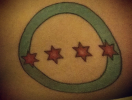Not 24 hours ago did I read a blog post that kind of blew my mind. It wasn’t in the sense that I was exposed to something new and life-changing, but it connected the dots and made sense of a lot of commonalities that have society-changing results.
Heather Gabel, who I have yet to meet in person, writes in “The Things They Don’t Want to See” about people with disabilities and the assumptions made about them. Analogized through staring, the assumptions result as insults and are biased to those making them. I won’t butcher it anymore. If you want, read it.
This quote summed the whole thing up perfectly:
MY EXISTENCE IS NOT LIMITED TO THE IMAGINING OF WHAT IT MUST BE, BUT IT IS IMPACTED BY THE KNOWLEDGE THAT WHAT I DO TO SURVIVE CONSISTS OF THE THINGS THEY DON’T WANT TO SEE.
C’mon… how many times have you heard, “I don’t know how you can take shots every day. I wouldn’t be able to do it.” The typical response to this, if you’re anything like me is something like, “Trust me. You’d do anything in order to stay alive.”
I started thinking about situations like this– comments, questions, assumptions– where I was pigeon-holed. I mean, on top of the assumptions about being Latina, I also get assumptions from both sides about my diabetes. One is invisible, until I make them aware, whether it’s through answering their question about my insulin pump being a pager or in telling a story. The other is visible because of my features, tan skin and dark hair but also my last name and the languages I speak.
About four years ago, I developed vitiligo. It’s not necessarily tied to diabetes, but the fact that I have one autoimmune disease, I’m susceptible to more. While others have thyroid issues and celiac disease, I lose pigmentation of my skin. I’m saying this because it’s true: It’s not a big deal. Compared to diabetes and thyroid issues and all those other lovely autoimmune issues, vitiligo has no harmful effects besides horrendous sun burn. No pigmentation = no protection = very sensitive skin. I’m basically turning white. There have been super stars and super models with it, but who am I?
People don’t mind staring at me. Some ask if there is something wrong. Other’s ask if it’s temporary. Others just stare. Good thing I’m loud and present. I don’t mind answering questions because that person had the courage to ask about something that s/he assumes I’m sensitive about. I’m not.
A colleague of mine only addressed my vitiligo after I told him that I wasn’t born this way– which many also assume. “Can I ask you a question? That is, if you don’t mind me asking,” he said one day. I told him I didn’t care. This isn’t as bad as diabetes can get. I just don’t have color and my color, or lack thereof, shouldn’t be what makes people treat me differently. Isn’t that racism of some sort? Xenophobic?
No one will ever understand what it feels like to be the person who has assumptions made on the daily because she is Latina, has diabetes, is a woman and has vitiligo. Lucky for the rest of the world, you’ll never have to really guess how I feel. My face, tonality and diction speak for me. People make assumptions about me every day and in the end, I really don’t care because I know who I am. However, this still has to change.
I agree with Heather when she takes it down to the minute details. Encouraging your children to feel comfortable and telling them that people are different in so many different ways can one day help both sides. Don’t assume that we’re all sensitive, bitter or afraid, because we aren’t. We’re normal.

1 Comment